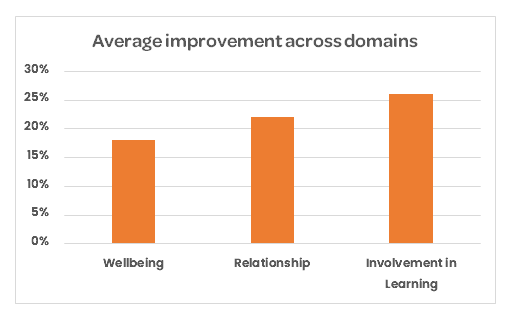Located 30km from Launceston Tasmania, Lilydale District School (LDS) sits on the lands of the Stoney Creek Nation clans. The school has over 360 students, from Kindergarten to Year 12.
Over 2020 and 2021, a team at LDS did the 4-day Berry Street Education Model (BSEM) training and began their efforts to implement and embed the model in their school.
The school recently shared with us a snapshot of their achievements, and some of the pre- and post-implementation data they have gathered to track the differences they are making with BSEM.
Members of the broader community are reporting a much more calm and orderly learning environment, and improvements in students’ ability to self-regulate.
Setting clear and measurable goals
Lilydale District School started implementing the Berry Street Education Model by setting specific, clear and measurable goals for using BSEM in their context. This considered approach has proved worthwhile. It has allowed them to collect rich and meaningful data to understand the impact of the training for their school community.
Vision: What will improvement look like? Where will we be in 3 years as a result of our work?
To be a supportive school community that promotes academic, social and emotional growth, and provides a safe, calm and healing learning environment.
Mission: What drives us? What is our work about?
To ensure all students have opportunities for healing, growth and achievement, within a trauma-informed environment.
Purpose: Why do we do it?
Our students need targeted and explicit wellbeing support to build the skills and dispositions to learn, heal, and to be successful in life.
Our staff need to flourish through support for their learning, growth and wellbeing, and their understanding of how to support students’ needs.
The school has achieved or partly achieved all its goals. Given the disruptions over the last few years, this is particularly impressive.
Read on to see a snapshot of some of the positive results that Lilydale are seeing two years into implementing the Berry Street Education Model.
The Berry Street Education Model is central to everything we do…it sets the foundation for academic progress and general wellbeing.
1. At the end of 2021, all teaching staff will have been observed using identified BSEM strategies and practices. (Achieved)
2. All classrooms have resources and physical environments that support trauma-sensitive practice. (Achieved)
The school’s Wellbeing Team conducted formalised classroom observations to review the implementation of the Ready to Learn model in classrooms.
- 100% of staff observed either developing or embedded use of explicit strategies to support student capacity for self-regulation.
- 100% of staff have access to resources to provide student regulation support within their classroom environments – flexible seating, designated calming space, rocking chairs, sensory tools.
Students are self-identifying when they need either a quiet or active reset and can successfully use the strategies. They request Brain Breaks at regular periods throughout the day. Students are using the language of being 'ready to learn', zones, resets, Brain Breaks and so on.
3. Whole staff implementation of the Berry Street Education Model, embedding the Body and Relationship domains, and introducing domains of Character, Stamina and Engagement. (Partly achieved)
4. Staff understanding about trauma and trauma-informed practice will increase across school-based survey measures from 2020 to 2021. (Achieved)
Lilydale District School conducted exhaustive staff surveys in 2020 and 2021 to assess the impact of the Berry Street Education Model on teaching and learning practice.
- 80% of LDS educators reported that their understanding of the ways in which trauma can impact how students learn has grown somewhat or significantly since implementing the Berry Street Education Model.
- 80% of teaching staff can articulate a personal mission and purpose aligned to a collaboratively developed schoolwide vision for trauma-informed practice.
- 100% of staff implemented a personal action plan to embed BSEM practices into their teaching and learning programs and routines.
The Berry Street Education Model is pivotal to improving student outcomes at LDS. With such a high level of trauma (ACEs) within our school, it is difficult to tap into students' executive functioning abilities (academic learning) without using a trauma-informed approach like Berry Street.
5. Increase in “High Wellbeing” in the relationship, school belonging and school climate markers. (Achieved)
The Student Wellbeing and Engagement Survey is conducted annually in all Tasmanian Government Schools with students in Years 4-12. LDS saw a positive increase across all indicators, contrasting favourably with general trends across the state that are thought to be a result of the disruptions presented during the pandemic.
| LDS change (2019 - 2021) | TAS change (2019 – 2021) | ||
|---|---|---|---|
| Connectedness to adults at school | LDS change (2019 - 2021) +13% |
TAS change (2019 – 2021) +2% |
|
| Important adults at school | LDS change (2019 - 2021) +15% |
TAS change (2019 – 2021) +11% |
|
| School climate | LDS change (2019 - 2021) +10% |
TAS change (2019 – 2021) -2% |
|
| Emotional engagement with teachers | LDS change (2019 - 2021) +11% |
TAS change (2019 – 2021) -1% |
|
| School belonging | LDS change (2019 - 2021) +7% |
TAS change (2019 – 2021) -3% |
|
| Emotional regulation | LDS change (2019 - 2021) +2% |
TAS change (2019 – 2021) -4% |
I have noticed a significant shift in the behaviour inside and outside the classroom...I have not needed to make a single call to senior staff for support this year. A huge shift from 3 years ago.
6. Decrease in the emotional regulation “low wellbeing” ratings. (Achieved)
While emotional regulation "Low Wellbeing" ratings decreased by 12% for Lilydale District School, "low wellbeing" ratings for Tasmania increased by 5%. This is another indicator that the work in supporting regulation for their students may have buffered some of the impacts of the disruption felt by students and their families in 2020-21.
They are ready to learn faster once self-regulation strategies have been taught and revisited regularly. Taking the time to build relationships has also created a calmer space.
7. Students can articulate and use strategies to help them to self-regulate. (Achieved)
Formal records lodged in the Tasmanian ‘Student Support System’ show an 18% decrease in inappropriate behaviour observations in 2021, compared to before the school engaged in the BSEM training. Principal Jeanette Papageorgi believes this is linked to increases in capacity to self-regulate that staff are seeing in students.
Students regulate much more quickly than the beginning of the year. Earlier, a lengthy period was required to calm down. Students know to regulate and will ask to use certain strategies to regulate. Discussions regarding what had happened are more positive and accepted.
8. Students involved in Tier 3 intervention will show growth in at least 2 domains of survey data. (Achieved)
School-based student surveys were conducted with students who had participated in group interventions for students with significant and complex needs (Tier 3) for at least 6 months. All students showed growth in the 3 survey domains:
- Wellbeing – Feeling safe at school
- Relationships – Feeling connected to others at school
- Involvement in learning – Feeling engaged and focused on learning activities

Students are using the language and terminology a lot more. Using it as their “go-to response” as opposed to leaving the room.
The school’s BSEM journey continues
Lilydale District School will continue to review and refine their BSEM strategies and is now planning its next steps for consultation support and participation in BSEM’s masterclass training sessions. BSEM is proud to be working alongside Lilydale District School and we look forward to sharing more about their success in the future.
Gains have been made in responsiveness, wellbeing, self-awareness and regulation. I believe that through conversations, modelling and repeated teachings of strategies we can have an impact well past Year 12.
More about the Berry Street Education Model
Developed by teachers for teachers, the Berry Street Education Model (BSEM) provides educators with a toolkit of over 100 practical strategies for immediate use in the classroom and across your school.
BSEM shows educators how they can build student engagement and support an improved capacity for school achievement by:
- understanding the benefits of trauma-informed teaching on child development and ability to learn
- creating a supportive and trauma-informed positive education classroom
- bolstering student-teacher relationships
- applying positive, relational classroom and behaviour management strategies
- instilling strengths-based practices across the school.



